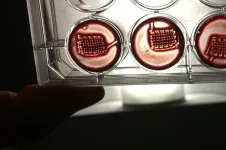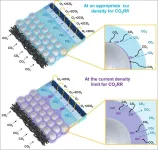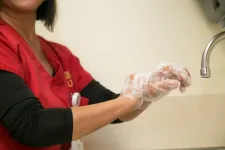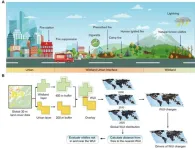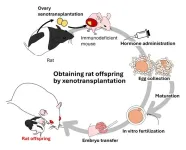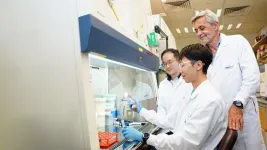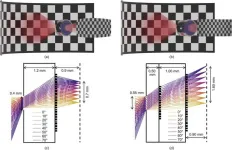Scientists transform blood into regenerative materials, paving the way for personalized, blood-based, 3D-printed implants
2024-11-15
(Press-News.org)
Scientists have created a new ‘biocooperative’ material based on blood, which has shown to successfully repair bones, paving the way for personalised regenerative blood products that could be used as effective therapies to treat injury and disease.
Researchers from the Schools of Pharmacy and Chemical Engineering at the University of Nottingham have used peptide molecules that can guide key processes taking place during the natural healing of tissues to create living materials that enhance tissue regeneration. The research published today in Advanced Materials.
Most of our body tissues have evolved to regenerate ruptures or fractures with remarkable efficacy, as long as these are small in size. This healing process is highly complex. The initial stages rely on liquid blood forming the solid regenerative hematoma (RH), a rich and living microenvironment comprising key cells, macromolecules, and factors that orchestrate regeneration.
The team developed a self-assembling methodology where synthetic peptides are mixed with whole blood taken from the patient to create a material that harnesses key molecules, cells, and mechanisms of the natural healing process. In this way, it was possible to engineer regenerative materials capable of not only mimicking the natural RH, but also enhancing its structural and functional properties.
These materials can be easily assembled, manipulated, and even 3D printed while maintaining normal functions of the natural RH, such as normal platelet behaviour, generation of growth factors, and recruitment of relevant cells important for healing. With this method, the team has shown the capacity to successfully repair bone in animal models using the animal’s own blood.
Alvaro Mata, who is Professor in Biomedical Engineering and Biomaterials in the School of Pharmacy and the Department of Chemical and Environmental Engineering at the University of Nottingham and led the study, said: “For years, scientists have been looking at synthetic approaches to recreate the natural regenerative environment, which has proven difficult given its inherent complexity. Here, we have taken an approach to try to work with biology instead of recreating it. This “biocooperative” approach opens opportunities to develop regenerative materials by harnessing and enhancing mechanisms of the natural healing process. In other words, our approach aims to use regenerative mechanisms that we have evolved with as fabrication steps to engineer regenerative materials”
Dr Cosimo Ligorio from the Faculty of Engineering at the University of Nottingham is co-author on the study, he says: “The possibility to easily and safely turn people’s blood into highly regenerative implants is really exciting. Blood is practically free and can be easily obtained from patients in relatively high volumes. Our aim is to establish a toolkit that could be easily accessed and used within a clinical setting to rapidly and safely transform patients’ blood into rich, accessible, and tuneable regenerative implants”.
END
ELSE PRESS RELEASES FROM THIS DATE:
2024-11-15
The New Phytologist Foundation is delighted to announce that Professor Maarja Öpik will take up the position of Editor-in-Chief of New Phytologist from January 2025 for an initial term of five years.
Maarja has served as a member of New Phytologist's editorial board since 2013 and is Professor of Molecular Ecology and Director of the Institute of Ecology and Earth Sciences at the Faculty of Science and Technology at the University of Tartu, Estonia.
Maarja’s research addresses the interactions between plants and mycorrhizal fungi, with ...
2024-11-15
Mountain lions in greater Los Angeles are proactively shifting their activity to avoid interacting with cyclists, hikers, joggers and other recreationists, finds a study from the University of California, Davis, Cal Poly Pomona and the National Park Service.
The study, published Nov. 15 in the journal Biological Conservation, found that mountain lions living in areas with higher levels of human recreation were more nocturnal than lions in more remote regions who were more active at dawn and dusk. The authors said their findings offer a hopeful example of human-wildlife coexistence amid a large, dense human population.
“People are increasingly enjoying recreating ...
2024-11-15
In May, the WHO raised the alarm over the rise in incidence of sexually transmitted illnesses (STIs) in many regions of the world, currently running at more than a million new cases per day. Among high-income countries, the US has one of the highest prevalences of STIs, and this problem is getting worse. For example, the incidence of chlamydia has more than doubled since 2000, while gonorrhea increased by 40% and syphilis by 400%. The highest prevalence is among young adults between 20 and 34 years of age.
Over ...
2024-11-15
The research team led by Dr. Hyung-Suk Oh and Dr. Woong Hee Lee at the Clean Energy Research Center at Korea Institute of Science and Technology (KIST, President Sang-Rok Oh) has developed a silver-silica composite catalyst capable of reversible local pH control through a silica-hydroxide cycle, inspired by Earth’s natural cycles. This research draws inspiration from the carbonate-silicate cycle, known as the Earth’s inorganic carbon cycle, where carbon dioxide (CO₂) maintains balance. CO₂ is removed from ...
2024-11-15
LOS ANGELES — Keck Hospital of USC earned an “A” Hospital Safety Grade from The Leapfrog Group, an independent national nonprofit watchdog focused on patient safety.
This is the ninth “A” grade the hospital has received since 2019.
“An ‘A’ grade once again puts Keck Hospital among the safest hospitals in the nation, and reflects the hospital’s dedication to maintaining the highest standards of quality and safety protocols,” ...
2024-11-15
Bethesda, Maryland, USA, 14 November 2024 – A landmark paper by distinguished neuroendocrine psychiatrist Dr. Philip W. Gold, published in Brain Medicine's Seymour Reichlin Centenary Festschrift collection, presents a masterful synthesis of how depression fundamentally alters the body's stress response systems, challenging long-held views of the condition.
The Viewpoint Review, published online November 14, 2024, represents a culmination of Dr. Gold's pioneering work in neuroendocrine psychiatry and honors the centenary of Dr. Seymour Reichlin, a foundational figure in neuroendocrinology whose ...
2024-11-15
Rapid human expansion into natural landscapes, resulting in the growth of the wildland-urban interface (WUI), has heightened risks associated with wildfires.
Prof. WANG Jianghao’s team from the Institute of Geographic Sciences and Natural Resources Research of the Chinese Academy of Sciences has recently mapped global WUI changes in 2000, 2010, and 2020, revealing alarming upward trends in WUI areas.
This work, published in Science Advances, provides critical insights into how urbanization can intensify potential wildfire risks faced by people worldwide.
Against ...
2024-11-15
Niigata and Toyama, Japan - The idea of maturing oocytes in the ovary to produce offspring has been implemented in various ways. One such method, ovarian transplantation, is a relatively simple procedure for obtaining eggs, compared to in vitro culture of ovaries and follicles. However, it is still difficult to transplant ovaries into cellular immunodeficient mice and produce offspring from the eggs grown in the mice.
In order to produce offspring from xenotransplanted ovaries, Japanese researchers at Niigata University and University ...
2024-11-15
Singapore, 15 November 2024 — A novel test developed by Duke-NUS researchers enables real-time monitoring of T cells that have been engineered to fight cancer, after re-introduction into the body of a cancer patient. This simple and innovative test provides clinicians with the ability to track the function of these cancer-fighting cells over the course of the treatment.
T cells are a type of immune cell that seeks out and destroys cells infected by viruses, bacteria as well as tumour cells. Originally ...
2024-11-15
In a recent study, researchers have developed a compound metalens that enables distortion-free imaging. The study, published in Engineering, presents a novel approach to on-demand distortion engineering using compound metalenses.
Metalenses have emerged as a promising technology with applications in beam steering, imaging, depth sensing, and display projection. However, optical distortion, a crucial factor in optical design, has been relatively unexplored in the context of meta-optics. The researchers addressed this gap by demonstrating ...
LAST 30 PRESS RELEASES:
[Press-News.org] Scientists transform blood into regenerative materials, paving the way for personalized, blood-based, 3D-printed implants
